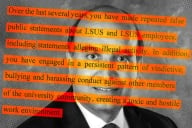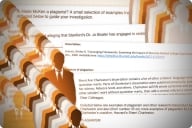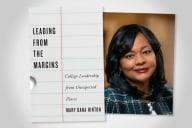You have /5 articles left.
Sign up for a free account or log in.
Conspiracy theories abound when it comes to professors and politics. To hear some conservatives tell it, a liberal-dominated professoriate attempts to brainwash students and to keep out of the faculty club any who challenge leftist orthodoxy. Ph.D. programs in the humanities teach some sort of secret handshake that lets those with politically correct views land the best jobs. To hear some liberals talk about it, there is no such thing as a liberal professoriate. Rather, a well-financed group of conservatives and their foundations use the politics issue to trash higher education. If there aren't more conservative professors around, it's because those on the right prefer the world of money to the world of ideas, and flock to Wall Street.
Neil Gross will disappoint most of the conspiracy theorists with his new book, Why Are Professors Liberal and Why Do Conservatives Care?, which is being released today by Harvard University Press.
Gross has spent years conducting research -- large-scale national surveys and smaller experiments and focus groups -- on professorial politics. And the book combines many of his studies, interviews with players in the debate, and a mix of history and sociology.
From the part of the book title that asks "why are professors liberal," it's clear that Gross has no problem saying that faculty members are in fact, on average, to the left of most other Americans. The degree to which this is true may differ by institution and discipline, and there are of course plenty of exceptions. But Gross cites his own past research to show that professors do indeed lean to the left. But that same research shows that most faculty members are not as radical as many believe and that there is a large center-left following in the academy.
Gross himself fits into that group. A professor of sociology at the University of British Columbia, he notes that he is an American expat and a Democrat. He writes that he has "very liberal social attitudes and more center-left views when it comes to issues like government regulation of the market and criminal justice policy." He writes that he tried not to let his politics influence his research or the writing here -- and the tone of the book, even when criticizing various ideas, is not dogmatic or partisan. (In a sign that he succeeded, The Weekly Standard published a generally positive review of the book by Mark Bauerlein, an Emory University professor who has written critically about ideological trends in academe.)
But while Gross doesn't view it as a particularly difficult question to determine whether professors are disproportionately liberal, he acknowledges the difficulty of explaining why, and he reviews various approaches to answering the question. He cites a series of studies he has done that suggest a self-selection at play in explaining why liberals are more likely than conservatives to gravitate toward Ph.D. programs that will lead to the professoriate. (Some of his past work that relates to this theme may be found here and here.)
And one way Gross backs up his theory of self-selection is by analyzing the potential for discrimination in graduate programs. With colleagues, he conducted an "audit" of graduate programs, sending off e-mails to graduate directors of programs in a variety of disciplines, posing as undergraduates looking for the right place to apply. The messages were similar in describing academic backgrounds, but some mentioned nothing about politics, while others briefly mentioned past experience working for either the Obama or McCain campaigns. (This project was done following the 2008 presidential election.) The idea was to test whether students might receive more or less encouragement based on their politics -- and no bias was found.
While some of the book explains and analyzes these findings, Gross also considers why the idea of a liberal professoriate is so powerful with some conservatives. He includes history of the William F. Buckley critique of professors as liberal and anti-religion, and notes that much of the frustration has come from people who care about ideas and who (in the case of Buckley and some of the National Review crowd) can hardly have been called populists.
But he also notes the strong resonance for many in the general public with the idea of professors as elite, liberal and disconnected. While he reviews the extent to which conservative foundations have funded organizations that have made a big deal out of professorial politics, he suggests that the views of many people about academics operate independently of anything David Horowitz said or did.
In an interview, Gross discussed why he sees it as crucial for academe to have a better handle on issues of faculty politics -- and it's not because it answers critics who say that academe imposes an ideological litmus test on professors. Rather, he thinks the findings pose challenges for those across the ideological spectrum.
For those who are conservative, and profess to care about a partisan imbalance in academe, Gross said, there is the question of whether their own statements are discouraging young conservatives from going to graduate school to prepare to become professors. The conservative undergraduate who reads about alleged liberal academic outrages all the time may simply come to view academe as a less-than-hospitable employer -- even if that's not necessarily the case.
But cutting back on the rhetoric may be easier said than done. "Among some conservatives, opposition to the liberal professoriate has become part of the identity, part of what it means to be a conservative," he said.
Perhaps, he said, now could be a time for such a re-evaluation. After all, some Republican leaders are arguing in the wake of President Obama's re-election that the party has been hurt by its image of being intolerant of immigrants and various other groups. "Higher ed is no less of a high-profile issue than immigration," Gross noted, and many Republicans have expressed concerns about voting trends (away from the party) by young voters. If conservatives were to tone down rhetoric about higher education, he said, they might see more people they agree with try to become professors.
Gross acknowledged seeing no signs to date that the conservatives are moving in this direction.
But even if there is not a liberal cabal controlling academic hiring, Gross said, that's no reason for liberal academics to say that they can ignore the political imbalance that exists.
"I do think that it is very difficult a sustain an institution like higher education without some modicum of bipartisan support in a country that has two really strong political parties, and I do think that higher education might do well to be mindful of that," Gross said.
And this concern may be of particular importance in "an era of scarcity," such as the one higher education faces now.
Higher education is also hurt, he said, by the lack of trust with which research and historical evidence are treated. "What happens in a society when no one can agree on facts? When there isn't a set of trusted authorities," he asked.
Gross stressed that he was not blaming academics for this challenge. "I think the bulk of the blame falls on other parties," he said. But that doesn't mean academics shouldn't ask themselves: "Have we contributed to the perception that our findings can't be trusted?"
There are no easy solutions, he said. But that doesn't mean academics should dismiss the issue. Perhaps, he suggested, academics could start with the basics.
"I think we could do a better job in higher education of asking students to engage with one another across party lines, and to have really civil forms of dialogue with one another," he said. "There certainly are opportunities for people to meet and interact with people with opposite points of view, and we could do more of that."








